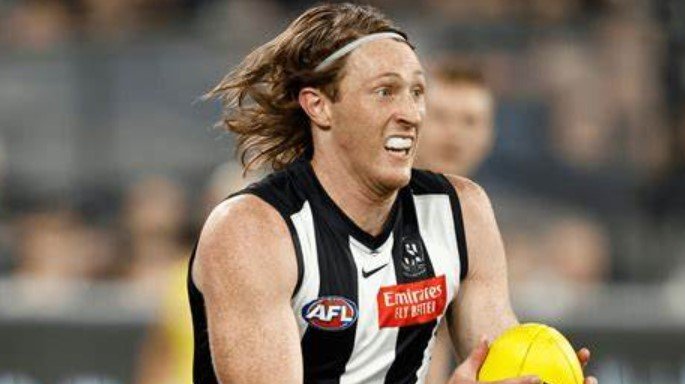In a move that has sent ripples through the Australian Football League, Nathan Murphy, a key defender for the Collingwood Magpies, has announced his retirement at the age of 24 due to ongoing concussion symptoms. This decision comes after a series of head injuries, the most recent of which occurred during the 2023 Grand Final, leaving a promising career unfulfilled and sparking a conversation about the safety of athletes in contact sports.
The Rising Star’s Sudden Eclipse
Nathan Murphy’s journey to the AFL was marked by early promise and rapid ascension. Drafted by the Collingwood Magpies, he quickly established himself as a reliable force within the team’s defensive ranks. His agility and acumen on the field were pivotal in the Magpies’ campaigns, culminating in a Grand Final victory that would unfortunately herald the end of his playing days.

Murphy’s final match was marred by a concussion, a cruel twist of fate for the young star. The incident was a stark reminder of the risks inherent in the sport, and it cast a shadow over the celebrations. In the months that followed, Murphy faced a grueling recovery, grappling with the long-term implications of his injury.
The decision to retire was not made lightly. Murphy consulted extensively with medical professionals, teammates, and his family. The consensus was clear: his health and future well-being had to take precedence. The announcement was a sobering moment for the club and its supporters, who had witnessed Murphy’s potential firsthand.
The Toll of Concussion
The impact of concussion on athletes extends far beyond the initial injury. For Murphy, the symptoms persisted long after the game had ended. Headaches, migraines, and anxiety became part of his daily life, challenging his ability to function both on and off the field.
The AFL’s medical concussion panel played a crucial role in Murphy’s decision. Their advice, grounded in a growing body of research on the long-term effects of head injuries, underscored the seriousness of his condition. The panel’s involvement highlights the league’s commitment to player safety, even when it means losing a talented player in their prime.
Murphy’s retirement is a stark reminder of the physical toll that contact sports can exact. It raises important questions about the measures in place to protect players and the need for ongoing research into concussion management and prevention.
Looking Ahead: Life After Football
As Murphy steps away from the field, his focus shifts to the future. The support from the Collingwood community has been overwhelming, with fans and teammates expressing their gratitude for his contributions to the club. Murphy’s legacy, though brief, will be remembered for his dedication and the mark he made on the game.
The AFL community is now reflecting on how to better safeguard its players. Murphy’s case is a catalyst for change, prompting discussions on rule modifications, improved protective gear, and enhanced medical protocols. The hope is that through these efforts, the risk of concussion can be mitigated for the next generation of players.
Murphy’s retirement is not just the end of a career; it’s the beginning of a larger dialogue about the intersection of sports and health. As he embarks on this new chapter, his experience serves as a powerful testament to the importance of prioritizing long-term well-being over short-term gains.









